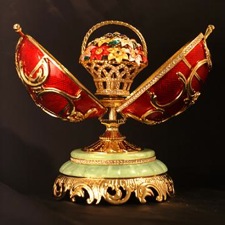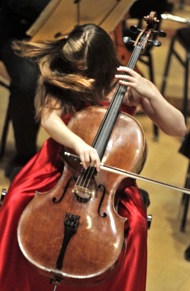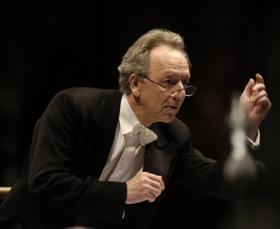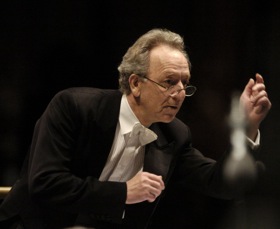Judge a lens by the best photo you get. The sharpest, richest picture is what the lens produces; whatever is inferior is the responsibility of circumstances and, mostly, of "operator error."
Just as I treasure the first picture I ever shot with a Rollei-35, of a 3D-looking water surface beneath a Hong Kong ferry (the quality of which has never since been duplicated and the little camera lost long ago) for me the essence of Yuri Temirkanov will always be his conducting and stage direction of the San Francisco Opera Onegin performances in 1997.
Even after an Onegin-saturated youth in Budapest, those experiences in the War Memorial — six of the eight performances — were seminal in their authenticity, mastery, combined discipline, and freedom.
How does that "best of" Temirkanov compare with the conductor on the podium at Davies Symphony Hall Sunday, leading the St. Petersburg Philharmonic?
Mirabile dictu, the moment of truth arrived at the very beginning of the concert, with the downbeat on Rimsky-Korsakov's Russian Easter Overture. This isn't a figure of speech, just a fact: My jaw dropped.
The gospel hymn of "Let God Arise" and the ecclesiastical theme "An angel wailed" permeated the hall with a grand, gorgeous sound, with secure brass soaring atop magical and velvety strings — 50 of them — in perfect unison. It was lush and brilliant, as a basketful of the most elaborate Fabergé eggs. The whole piece: a new "best of" for Temirkanov.

Besides the absolute high value, this calling card also amazed in comparison. Neither at their numerous San Francisco appearances nor elsewhere when I heard the St. Petersburg live have I had anything like this experience.
Some of the Davies concerts of the past, in fact, offered a thoroughly mixed bag of good, average, and even poor playing. There was an unfortunately weak Mahler, Yefim Bronfman banging through the Rachmaninov Piano Concerto No. 3, and blank, expressionless faces everywhere on stage (a tradition from the Soviet era).
Not tonight. The orchestra looks much younger, it has more women players than before, and music is served without looking — or sounding — grim.
It may seem strange to place so much emphasis on the opening overture, but it was truly unforgettable, a musical bliss, whose surprise kept it sharply etched in memory even as the major portion of the evening was thoroughly enjoyable.
And major it was, with Shostakovich's Cello Concerto No. 1 and the Brahms Symphony No. 4, both played exceptionally well. Alisa Weilerstein was the outstanding soloist in the concerto, bravely tackling a work so completely identified with Mstislav Rostropovich, for whom it was written, and who alone performed this bravura piece for years after the 1959 premiere.
The orchestra was big and brassy, completely caught up in the obsessive ostinato of the opening march, which then becomes a leitmotif of the work and a permanent resident in the brain. As in the Rimsky, strings were wonderful, and the woodwinds and brass were spectacular. And then came the essence of the concerto, probably the longest and certainly the most dramatic and personal cadenza in all music. "Obsessive" this time applied to the young cellist, who was so deeply involved in the music, it took her a few seconds to realize that while she lasted through the cadenza, the instrument didn't — a string broke.

Weilerstein stopped playing, looked around in confusion, then stood up and walked off the stage. All of five minutes before the end of the piece. The audience laughed and applauded, unable — naturally, but unfortunately enough — to sustain the deeply sad and desperately passionate atmosphere created by the music (or what could be heard of it through a persistent storm of coughs, mostly reserved for the quietest passages). After a few minutes of waiting, Temirkanov too left the stage, and eventually the two returned, and finished the concerto, to tremendous applause.
Were this to happen in a violin concerto (and with a more experienced soloist), the concertmaster would have passed over his or her own instrument, and the music would have continued. But no matter: Soloist and orchestra performed a great, difficult work splendidly.
What is the oldest Russian orchestra doing playing Brahms? Unlike the snafu with Mahler, Temirkanov and the Philharmonic performed the work superbly. No Germanic precision here, but heartwarming Russian romanticism — a perfectly acceptable, even welcome, substitution.
The opening Allegro non troppo was big and just a bit noisy, the Andante moderato sang passionately (more Tchaikovsky than Brahms proper), and then the Allegro giocoso really brought it all home, big, pleasantly raucous, and altogether joyful. The orchestra raced through powerfully the virtual afterthought of the fourth movement.
Through it all, Temirkanov conducted in his usual unshowy, simple and effective manner, focusing on the music and the players, not dancing for the audience. (Not that there is anything wrong with Gustavo Dudamel, and the like — it's just a matter of style and personality.)
The encore was the "Nimrod" episode from Elgar's Enigma Variations, played the same way the concert began: thrilling, overwhelming.
This orchestra, not so incidentally, is truly and historically part of Temirkanov's life and career. From 1938 until his death in 1988, the legendary Russian conductor Evgeny Mravinsky headed what was then the Leningrad Philharmonic, Temirkanov serving as his assistant and also the head of the Kirov, for which the Philharmonic has always served as the court, later house, orchestra.
At the Kirov, Temirkanov hired a 24-year-old assistant by the name of Valery Gergiev. Somehow — and that's a long, complex story — in 1988, Gergiev became music director of the Kirov, and Temirkanov took over the Philharmonic after Mravinsky's death.
Through thick and thin, a great deal of both in the post-Soviet country, Temirkanov stayed with the orchestra, although in recent years, Gergiev — both at the Kirov and in concerts — often headed it.
Temirkanov's association with the musicians for more than three decades is really paying off these days. If you missed the Sunday concert, there is still one to come Monday night — be sure to look it up here.


